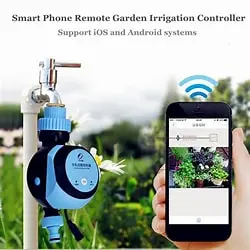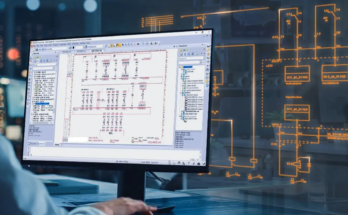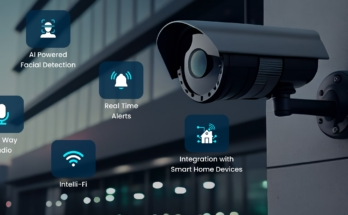Introduction: The Need for Efficient Water Management in Agriculture
Water is the lifeblood of agriculture, playing a pivotal role in crop growth and productivity. However, with rising global temperatures, unpredictable weather patterns, and growing concerns over water scarcity, it’s becoming increasingly important to manage this precious resource effectively. Traditional irrigation systems, while effective, often waste vast amounts of water through over-irrigation or inefficient distribution. This is where smart irrigation controllers come in.
Smart irrigation controllers are transforming the way farmers approach irrigation. By utilizing advanced technology and real-time data, these systems optimize water usage, reduce waste, and contribute to a more sustainable agricultural landscape. In this article, we’ll explore how smart irrigation controllers work, their benefits, and how they’re helping reduce water usage in agriculture.

What Are Smart Irrigation Controllers?
Smart irrigation controllers, also known as weather-based irrigation controllers or smart sprinklers, are automated systems designed to manage the watering of crops based on real-time data. These controllers utilize sensors, weather forecasts, and soil moisture levels to adjust irrigation schedules accordingly, ensuring crops receive the right amount of water at the right time.
Unlike traditional timers or manual systems, smart controllers are equipped with advanced features that allow them to automatically adapt to changing weather conditions, soil moisture levels, and other environmental factors. This results in more efficient irrigation, fewer water waste issues, and healthier crops.

How Do Smart Irrigation Controllers Work?
Smart irrigation controllers work by collecting and analyzing a range of environmental data. Here’s a breakdown of the key components:
1. Sensors and Weather Data
Smart controllers are typically connected to soil moisture sensors, weather stations, or even satellite data. These sensors collect real-time information such as temperature, rainfall, and soil moisture levels. The system then processes this data and adjusts watering schedules based on factors like evaporation rates, upcoming weather events, or the specific needs of different crops.
2. Adjusting Irrigation Schedules
The controller uses the data gathered to adjust the watering schedule. For example, if there’s an impending rainstorm, the controller might delay watering to avoid over-watering the crops. Alternatively, if the soil is dry, the system might increase the watering time.
3. Remote Monitoring and Control
Most smart irrigation controllers can be accessed and controlled remotely through mobile apps or web-based platforms. This allows farmers to monitor and adjust irrigation settings from anywhere, providing greater flexibility and convenience.
4. Automated Watering
Once the system is set up and configured, it runs automatically, ensuring that crops are watered optimally without the need for manual intervention.
The Role of Smart Irrigation Controllers in Reducing Water Usage
Water is one of the most critical resources in agriculture, but it is also finite. In fact, agricultural irrigation accounts for nearly 70% of global freshwater use. As populations grow, and climate change worsens, water scarcity is expected to intensify. In this context, smart irrigation controllers are playing an essential role in reducing water consumption.

1. Precise Watering
By using real-time data to determine soil moisture levels, smart controllers ensure that crops are watered only when necessary. This eliminates over-irrigation, a major source of water wastage in traditional systems. As a result, water is used more efficiently, reducing consumption without sacrificing crop health.
2. Weather-Responsive Irrigation
One of the standout features of smart controllers is their ability to respond to weather conditions. For instance, if a weather forecast predicts rain, the system will adjust or cancel irrigation to avoid watering crops unnecessarily. This feature is especially valuable in areas with fluctuating or unpredictable rainfall patterns.
3. Optimized Irrigation Schedules
Traditional irrigation schedules often follow a set time, regardless of the weather or moisture levels in the soil. Smart controllers, on the other hand, adjust watering schedules based on real-time data, ensuring that crops receive the ideal amount of water based on current conditions.
4. Reduced Runoff and Erosion
When water is applied excessively, it can run off the soil, carrying away valuable nutrients and leading to erosion. SIC help mitigate this issue by delivering water more precisely, minimizing runoff and promoting healthier soil.
5. Conservation of Water Resources
By reducing water waste, smart controllers help conserve water resources for future use. This is particularly important in areas facing drought conditions or regions that rely on limited water supplies. Efficient water usage ensures that resources are available for future generations, promoting sustainable agricultural practices.
Benefits of Smart Irrigation Controllers
The advantages of implementing SIC go beyond just water conservation. These systems offer a range of benefits that can enhance the productivity and sustainability of agricultural operations.
1. Cost Savings
By reducing water waste, smart controllers can lead to significant cost savings. Water is often one of the largest expenses for farmers, especially in water-scarce regions. By optimizing irrigation schedules and preventing over-watering, smart controllers can lower water bills and reduce energy costs associated with pumping water.
2. Increased Crop Yields
Efficient water management can result in healthier crops and higher yields. When crops receive the right amount of water at the right time, they grow more robustly and are less susceptible to stress. This leads to improved crop quality and higher productivity.
3. Sustainability
Smart irrigation controllers contribute to sustainable farming practices by minimizing resource waste and promoting efficient water usage. Sustainable farming is not only beneficial for the environment but also helps farmers maintain long-term profitability by reducing input costs.
4. Ease of Use
Most smart irrigation systems are designed with user-friendliness in mind. They are simple to set up, configure, and monitor. Additionally, many systems offer mobile apps that allow farmers to make adjustments on the go, providing greater flexibility and control.
5. Data-Driven Decision Making
The real-time data provided by smart irrigation controllers can help farmers make informed decisions about their irrigation needs. By monitoring soil moisture levels, weather patterns, and other variables, farmers can identify trends and adjust their irrigation practices accordingly.

Types of Smart Irrigation Controllers
Smart irrigation controllers come in various forms, each with its own set of features. Understanding the different types can help farmers choose the system that best suits their needs.
1. Weather-Based Controllers
These controllers use weather data, such as temperature and rainfall forecasts, to adjust irrigation schedules. They are ideal for regions where weather patterns play a significant role in irrigation needs.
2. Soil Moisture-Based Controllers
These controllers rely on sensors placed in the soil to measure moisture levels. They adjust watering schedules based on the current moisture content, ensuring that crops receive water when needed.
3. ET-Based Controllers
Evapotranspiration (ET) controllers calculate how much water a crop needs based on environmental factors like temperature, humidity, and wind speed. These controllers are highly efficient and particularly useful in large-scale agricultural operations.
4. Hybrid Controllers
Hybrid systems combine multiple data sources, including weather forecasts, soil moisture sensors, and evapotranspiration data. These controllers offer the most comprehensive and accurate irrigation management.
Factors to Consider When Choosing a Smart Irrigation Controller
When selecting a smart irrigation system, farmers must consider several factors to ensure they choose the right system for their needs.
1. Type of Crops
Different crops have varying water requirements. A controller that can adapt to the specific needs of different crops will be more beneficial for farms with diverse agricultural operations.
2. Climate Conditions
The local climate will influence the type of system that works best. For example, weather-based controllers are ideal for areas with fluctuating weather conditions, while soil moisture-based systems work well in regions with consistent rainfall patterns.
3. Size of the Farm
For large farms, hybrid or ET-based controllers may offer more comprehensive management, while smaller operations may benefit from simpler, more affordable options.
4. Budget
While smart irrigation controllers can reduce water costs in the long run, the initial investment might vary. Farmers should assess their budget and the expected return on investment.
Case Studies: Success Stories of Smart Irrigation in Agriculture
1. California’s Central Valley
Farmers in California’s Central Valley have successfully implemented smart irrigation controllers to address water scarcity. By using weather-based controllers, they’ve reduced water consumption while maintaining crop yields, even in drought-prone areas.
2. Australia’s Outback
In Australia, farmers dealing with harsh conditions in the outback have turned to soil moisture-based systems to ensure that their crops receive adequate water without waste. The result? Improved crop health and reduced water use.
Challenges and Limitations of Smart Irrigation Controllers
While smart irrigation controllers offer numerous benefits, they aren’t without challenges. Some of the limitations include:
1. Upfront Costs
The initial investment for smart irrigation systems can be high, especially for large-scale operations. However, the long-term savings often outweigh the initial costs.
2. Technical Knowledge
Farmers may need training to fully understand and operate smart irrigation systems, especially those that use complex sensors and data analytics.
3. Connectivity Issues
In remote areas, connectivity can be a problem. Smart controllers often rely on stable internet or cellular connections to transmit data, which can be an obstacle in rural areas with poor signal strength.
Click Here to Read More: Royal Regalia: A Timeless Tapestry of Power and Elegance
Conclusion: The Future of Smart Irrigation
Smart irrigation controllers are undoubtedly transforming agriculture, making it more sustainable and resource-efficient. By reducing water waste and optimizing irrigation schedules, these systems help farmers cope with water scarcity, improve crop yields, and reduce costs. While there are challenges to overcome, the benefits of adopting smart irrigation technologies far outweigh the drawbacks. As technology continues to advance, we can expect even more innovative solutions that will help ensure the future of farming remains both profitable and environmentally responsible.
Meta Description
Learn how smart irrigation controllers are revolutionizing agriculture by reducing water usage, improving crop yields, and promoting sustainability. Find out more!
FAQ
1. How do smart irrigation controllers help conserve water?
Smart irrigation controllers help conserve water by adjusting irrigation schedules based on real-time data such as soil moisture, weather conditions, and evapotranspiration rates, ensuring that crops receive only the water they need.
2. Are smart irrigation controllers easy to install?
Yes, most smart irrigation controllers are designed for easy installation. Many systems come with clear instructions, and some can be set up in a few simple steps, especially for smaller-scale farms.
3. Can smart irrigation systems be controlled remotely?
Yes, most smart irrigation controllers allow farmers to monitor and adjust their irrigation systems remotely using mobile apps or web-based platforms, offering greater convenience and flexibility.
4. What are the cost benefits of using a smart irrigation system?
By reducing water usage and energy consumption, smart irrigation systems can lead to significant cost savings over time, especially in areas with high water and energy costs.
5. What types of crops benefit from smart irrigation systems?
Smart irrigation systems are suitable for a wide range of crops, from row crops like corn and wheat to fruits and vegetables. The system can be customized to meet the specific water needs of each crop.

